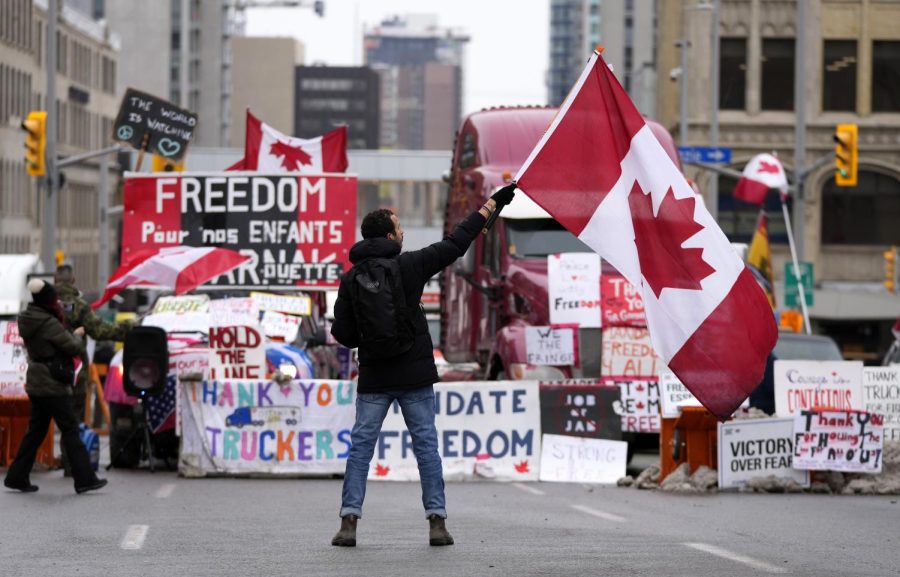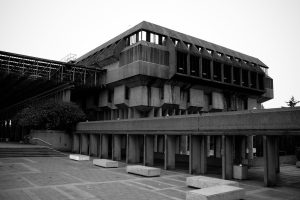Canadian “Freedom Convoy” threatens supply chain
(Justin Tang/The Canadian Press via AP)
A protester waves a Canadian flag in front of parked vehicles on Rideau Street at a protest against COVID-19 measures that has grown into a broader anti-government protest, in Ottawa, Ontario, Friday, Feb. 11, 2022.
Feb 23, 2022
In late January, groups of truckers traveled to Canada’s capital, Ottawa, due to the recent vaccine mandate for truckers traveling from the United States. These organizers called themselves the “Freedom Convoy,” as they had formed a blockade against trade at Ambassador bridge. This bridge is a vital part of the supply chain and trade industry between the United States and Canada. For the third consecutive weekend, the protestors have been able to maintain their presence. This protest has had a significant impact because “if men and women stop driving their trucks then everything, every product, every service, every object we reach for will be affected.”
These protestors have “raised about $10 million Canadian dollars, or $7.8 million U.S. dollars, through GoFundMe for their “Freedom Convoy” protests.” However, due to reported violent actions of the group, GoFundMe has removed their campaign from the site. Recent actions have resulted in police actions. The premier of Ontario has “declared a state of emergency on Friday and a judge ordered an end to the blockade on the Ambassador Bridge.” With multiple arrests in recent days, the bridge has been able to open once more. Despite the threats from the government, members of the “Freedom Convoy” have stated “they won’t stop until the mandates are lifted.”
The Canadian government, including Prime Minister Justin Trudeau, has increased its ability to respond to the protests. On Monday, Prime Minister Trudeau “took the rare step of declaring a national public order emergency on Monday.” According to Trudeau, these protests have been an illegal obstruction to the welfare of Canada. Therefore, this new action will allow the Canadian government to take greater actions to open up border crossings and regain control of the bridge. This new declaration will allow the government to override “certain civil rights, to restore public order, for example, banning public assemblies or restricting travel to and from specific areas.” This sparks increasing fear of the government’s ability to trump individual rights and liberties, even if it is a temporary measure.
These drastic actions from the Canadian government demonstrate the eagerness for countries to enforce vaccine mandates against COVID-19. Dwight Hahn, professor in the Political Science department at JCU, stated, “as operations to clear the protesters are now underway, the truck blockades of Canadian roads and bridges will probably soon end. However, similar protests this year in Canada and elsewhere including the United States are likely to happen again.” He also stated that “opinion polls that I’ve seen indicate that Justin Trudeau is probably responding to the blockades with the right amount of police power.” Hahn claimed it was “wise for Trudeau’s government to enforce Canadian law while at the same time seeking to address the common discernible complaints of the protestors related to Covid-19 restrictions.”
Colin Moorhead II is a junior from Wadsworth, Ohio and is a World News staff writer for The Carroll News. He can be reached through email at cmoorhead24@jcu.edu or on Instagram @colinmoorhead2.













